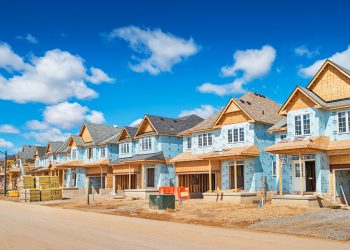The Mortgage Bankers Association’s (MBA) Research Institute for Housing America (RIHA) recently released a report—”The Impact of Climate Change on Housing and Housing Finance“—which shows that climate change will be adding stress to “the complex system of allocating risks across housing and housing finance stakeholders.
Key findings:
– Climate change will place increasing stress on housing and housing finance’s sophisticated system of distributing risk across multiple stakeholders—including consumers, landlords, home builders, appraisers, originators, servicers, insurance companies, government agencies and the GSEs, and mortgage investors.
– The Financial Stability Board’s (FSB) Task Force on Climate-Related Financial Disclosures (TCFD) recommends that firms divide climate-related risks into physical risks—adverse weather events and natural disasters, for example—and transition risks that firms face in a lower-carbon economy. Transition risks include policy and legal, technology, market and reputation risks.
– Climate change may alter the nature of flood risk and exacerbate the current challenges of the National Flood Insurance Program (NFIP).
– Along with increased flood risk and residential property damage, climate change may increase mortgage default and prepayment risks, trigger adverse selection in the types of loans that are sold to the GSEs, increase the volatility of house prices, and even produce significant climate migration.
– In addition to climate mitigation efforts to limit global warming, adaptation strategies are needed to make housing and housing finance more resilient.
– These strategies include incorporating building modifications into new construction (easier) and existing buildings (more difficult and more expensive) and increasing the resiliency of communities through infrastructure improvements and standards.
– Housing finance is likely to face increasing stress as the consequences of global warming mount and influence the behavior of portfolio lenders, the GSEs, the federal government’s FHA/VA programs and mortgage investors.
– The costs of mitigation and adaptation strategies pose significant challenges to their adoption.
– Firms in housing and housing finance face increased pressure to quantify the expected costs of future climate events, their climate change mitigation activities, and the burden of future regulations and laws.
– The report identifies three obstacles to quantifying the risk of climate-induced mortgage defaults: the choice of climate scenario, the lack of a recognized measure of climate risk, and the lack of a sufficient historical record of available climate risk metrics.
“The mortgage industry will not be spared by the growing impact climate change is having on the environment, governments and individuals. The physical destruction caused by flooding and other extreme weather events will continue to influence the behavior of portfolio lenders, the GSEs, the federal government’s FHA/VA programs and mortgage investors,” said Sean Becketti, author of the report and an industry veteran with over four decades of mortgage finance experience, in a statement. “Climate mitigation efforts are necessary to slow the adverse effects of global warming, and better and more standardized predictors of environmental risks are needed to make housing and housing finance more resilient.”
Added Becketti, “Projecting future climate change and its impacts remains challenging primarily because the outcome depends crucially on the actions chosen by governments, industries and households. Given the uncertainty over those actions, the future path of climate change could continue to get much worse.”
“RIHA’s study underscores the need for the mortgage industry to better address the growing impacts of climate change and prepare for increased reporting to regulators and investors on the quantitative estimates of climate-related risks,” said Edward Seiler, executive director, Research Institute for Housing America, and MBA’s associate vice president, Housing Economics, in a statement.
Source: MBA











